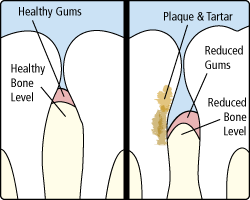
Gum disease, also known as gingivitis or periodontal disease, is an infection that occurs in the gums, deep tissues, and bones that support the teeth. It can affect children if proper oral health practices aren’t followed. If the disease is not treated, gum disease can ultimately lead to tooth loss.
How Gum Disease Starts
Your child’s mouth naturally produces a sticky substance called plaque. Without adequate brushing and flossing, this plaque builds up on the teeth.
The bacteria in plaque produce poisons, or toxins, which irritate the gums and cause infection. As the infection increases in severity, it breaks down the bones and tissues that hold your child’s teeth in place.
Gingivitis and Periodontitis
The initial stage of gum disease, known as gingivitis, is the mildest form of gum disease and is common in children.
During this stage, the gums become swollen and red, and may bleed after brushing or flossing. Gingivitis is frequently painless, so your child might not mention it is bothering them. With professional treatment and daily attention to oral hygiene, gingivitis can be reversed before it progresses.
Untreated gingivitis may develop into periodontitis, the more extreme form of gum disease.
Aggressive periodontitis can affect your child even if he or she is otherwise healthy. Localized aggressive periodontitis is found in teenagers and young adults. It mainly affects the first molars and incisors, and is characterized by the severe loss of jaw bone.
Generalized aggressive periodontitis may begin around puberty and involve the entire mouth. It is marked by inflammation of the gums and heavy accumulations of plaque and tartar. Eventually it can cause the teeth to become loose.
Signs of Gum Disease
Because gum disease can exist without pain or discomfort, it’s important to be aware of the possible warning signs that may indicate a problem.
- Gums appear red or swollen
- Gums feel tender
- Gums bleed easily during brushing or flossing
- Gums recede or pull away from the teeth
- Persistent bad breath
- Loose teeth
- Any change in the way teeth come together in the biting position
If you suspect that your child may be suffering from gingivitis or periodontitis, make an appointment with your pediatric dentist immediately. We can diagnose the problem, determine how far the disease has progressed, and recommend an appropriate treatment.